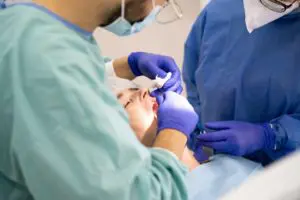Why You Need An Experienced Oral Surgeon to Treat Your Maxillofacial Trauma
Maxillofacial trauma is devastating, both physically and emotionally. Once the injuries you’ve sustained are stabilized, finding a reputable and skilled oral surgeon to perform the needed corrective and restorative surgeries is essential for having the best outcome possible.


What is maxillofacial trauma?
“Maxillofacial trauma” is used to describe injuries to the face, mouth, and jaw. This includes soft tissue damage like cuts or lacerations on your face or in your mouth, damaged or lost teeth, broken bones, or a combination of these. Most injuries are from accidents such as falls, car crashes, sports injuries, or violence from another person.
How is maxillofacial trauma diagnosed?
Injuries to your face and mouth are often first seen in ER rooms or urgent cares. This is a great first step in getting the care you need. In these instances, your attending doctor will do an exam and may order imaging such as x-rays, an MRI or CT-scan to look for fractures or other anomalies that would indicate the extent of the damage. The majority of hospitals do not have the capacity to fully treat these types of injuries, so it’s likely that your maxillofacial trauma will be stabilized, and you will be referred to, or encouraged to seek the help of, a specialist. Most doctors can offer basic treatment for maxillofacial trauma, but to ensure the best outcome, a specialized and experienced maxillofacial or oral surgeon should be sought.
What can be done to treat maxillofacial trauma?
There are many treatments available for different maxillofacial injuries. Depending on the location and extent of your trauma, your surgeon may recommend more than just one treatment. These can include:
- Dental implants. If one or more of your teeth was damaged beyond repair or knocked out, a dental implant can restore the original appearance of your smile.
- Corrective jaw surgery. Depending on the extent of the injury, it may warrant corrective surgery to help realign your jaw and help avoid problems down the road, like chronic pain and headaches.
- Bone grafts. If the area that was injured sustained enough trauma, bone loss could have occurred. In this case, damaged bone can be removed and grafts put in its place to encourage healthy, normal replacement.
- Soft tissue and skin grafts. For injuries where the skin was damaged or soft tissues destroyed, grafts will help bridge those voids and provide a sort of “scaffolding” for new skin or tissues to grow and repair.
Finding specialized, compassionate care for your maxillofacial trauma shouldn’t create more stress. For the best in oral surgery care in the Stillwater, Tulsa, or OKC area, schedule a consultation with us today!
Content found on this blog is intended for educational purposes only and should not be used as a substitute for professional judgement, advice, diagnosis, or treatment. Please speak with a professional if you have concerns about your oral health.